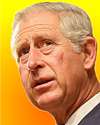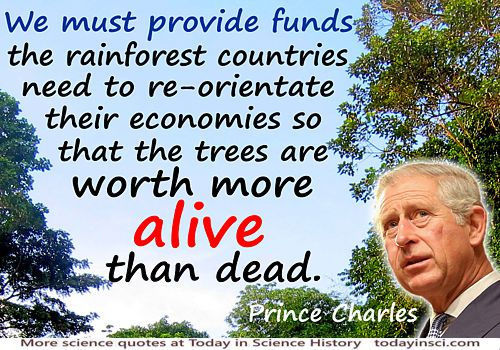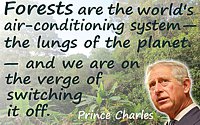 (source)
(source)
|
Charles, Prince of Wales
(14 Nov 1948 - )
British prince who, while heir apparent to the British throne, takes an active interest in civic issues such as architecture, the environment, education and disadvantaged people.
|
Prince Charles - Reforestation Quote
“Trees are Worth More Alive Than Dead”
Illustrated Quote - Large (800 x 600 px)

More Prince Charles quotes on science >>
The Context of Prince Charles' “Trees are Worth More Alive” Quote
In Nov 2008, the Prince of Wales delivered the Presidential Lecture, at the Presidential Palace, Jakarta, Indonesia, the world's third largest democracy. His main themes were the stewardship of Nature, the global concern with climate change, and the need for the whole world to unite and “with a real sense of urgency and resolve to act together.” He firmly believed that “We need, in fact, to see the problem in its broadest sense; it is not just a question of environmental protection but also one of social justice and community empowerment.”
“The purest way in which we can demonstrate this respect is through our relationship with Nature and the natural world. The eminent Islamic scholar, Yusef Ali, who brought such a deep understanding of the Koran to the West in the 1930s, puts it beautifully in his introductory commentary on the Suras when he says ‘God honoured Man to be His Agent and, to that end, endued him with understanding, purified his affections and gave him spiritual insight; so that Man should understand Nature, understand himself and know God through His wondrous signs and glorify Him in truth, reverence and unity.’ …”
In contrast, the Prince stated that: “In the absence of this harmony and stewardship we risk provoking a crisis between Man and Nature, and that is what I fear we are beginning to see all around us. Without doubt, climate change is the greatest manifestation of this crisis. …”
“We must recognize that what we have in common is far greater than what divides us.”
The Prince congratulated the Indonesian President for the initiatives he had taken to address the problems. Then the Prince explained the Rainforests Project he had started to help with the needed funding.
“The simple fact is that the world is not paying for the services the forests provide. At the moment, they are worth more dead than alive—for soya, for beef, for palm oil and for logging, feeding the demand from other countries. Speaking as someone from one of those countries, I think we need to be clear that the drivers of rainforest destruction do not originate in the rainforest nations, but in the more developed countries which, unwittingly or not, have caused climate change.”
For the remainder of his time, Prince Charles addressed how he believed the governments, companies and institutions around the world could become involved in constructive actions and the possible approaches to raising financial assistance.
“This is precisely why I started my Rainforests Project which … has three main elements. Firstly, to determine how much funding the rainforest countries need to re-orientate their economies so that the trees are worth more alive than dead. Secondly, to show how this funding can be provided by the more developed world and, thirdly, to help identify ways in which the funding could be used in a durable and equitable way by the rainforest nations.”
Prince Charles referred to the initiatives that were already in progress. “There are moves afoot to develop markets that can provide incentives to reduce deforestation. But this may take too long and we do not have the luxury of time. That is why we must find a way of anticipating these markets and helping them to develop; of mobilizing the truly awesome power of private sector capital to provide emergency financing. This is at the heart of my Project.
“My Rainforests Project will propose is this: the rainforest countries should draw up national development plans that reflect the needs of local communities and rural economies, and put in place the infrastructure and the institutional and commercial capability to enable them to prosper without deforestation.”
Deforestation illustrated quote, “Earth, Skinned Alive” >>
More Deforestation Quotes >>
- Science Quotes by Charles, Prince of Wales.
- Prince Charles - Context of the “Forests are the worlds air-conditioning system” quote - with medium image (500 x 350px).
- Prince Charles - Context of the “Forests are the worlds air-conditioning system” quote - with large image (800 x 600px).
- Prince Charles - Context of the “Rainforest countries need to re-orientate their economies so that the trees are worth more alive than dead” quote - with medium image (500 x 350px).






